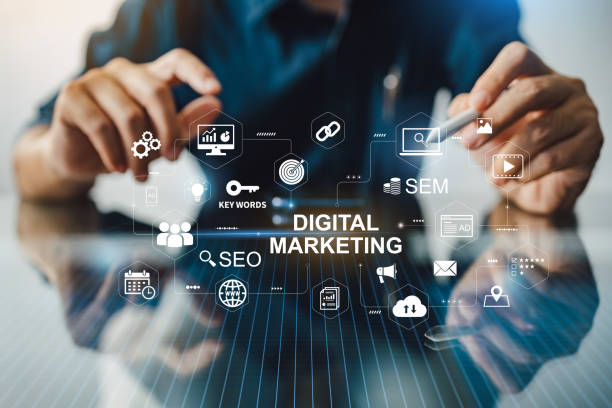
In today’s fast-paced digital world, businesses must leverage the power of digital marketing to stay competitive and reach their target audience effectively. Digital marketing encompasses a broad spectrum of strategies and tools designed to promote products and services online. From social media marketing to search engine optimization (SEO), digital marketing provides a multitude of opportunities for businesses to grow and thrive. In this comprehensive guide, we will delve into the key components of digital marketing, explore various techniques, and provide insights into how to create a successful digital marketing strategy.
Understanding Digital Marketing
Digital Marketing Defined: Digital marketing refers to the use of digital channels, platforms, and technologies to market and promote products and services to consumers. Unlike traditional marketing, which relies on print media, billboards, and television, digital marketing leverages the internet and electronic devices.
Key Components of Digital Marketing:
- Search Engine Optimization (SEO): The practice of optimizing a website to rank higher in search engine results pages (SERPs) to increase organic traffic.
- Content Marketing: Creating and distributing valuable, relevant content to attract and engage a target audience.
- Social Media Marketing: Using social media platforms to promote products and engage with customers.
- Pay-Per-Click (PPC) Advertising: A model of internet marketing where advertisers pay a fee each time one of their ads is clicked.
- Email Marketing: Sending targeted emails to a group of subscribers to promote products or services.
- Affiliate Marketing: A performance-based marketing strategy where businesses reward affiliates for driving traffic or sales through their marketing efforts.
- Influencer Marketing: Collaborating with influencers to promote products or services to their followers.
The Importance of Digital Marketing
Digital marketing is crucial for businesses of all sizes for several reasons:
- Reach a Wider Audience: With billions of people using the internet, digital marketing allows businesses to reach a global audience.
- Cost-Effective: Compared to traditional marketing, digital marketing is often more cost-effective, providing better ROI.
- Targeted Marketing: Digital marketing enables businesses to target specific demographics, ensuring that marketing efforts are directed towards the right audience.
- Measurable Results: Digital marketing provides access to analytics and data, allowing businesses to measure the effectiveness of their campaigns and make data-driven decisions.
- Increased Engagement: Digital marketing facilitates direct interaction with customers through social media, email, and other channels, fostering better engagement and customer relationships.
Crafting a Successful Digital Marketing Strategy
A well-planned digital marketing strategy is essential for achieving business goals and driving growth. Here are the steps to create an effective digital marketing strategy:
- Define Your Goals:
- Understand Your Audience:
-
- Conduct market research to understand your target audience’s demographics, interests, and behaviors. Create buyer personas to represent your ideal customers.
- Analyze Your Competitors:
-
- Analyze your competitors’ digital marketing strategies to identify their strengths and weaknesses. This can provide valuable insights and help you differentiate your brand.
- Choose the Right Channels:
-
- Select the digital marketing channels that align with your goals and audience. Common channels include SEO, social media, email marketing, and PPC advertising.
- Create High-Quality Content:
-
- Content is the backbone of digital marketing. Create valuable, engaging, and relevant content that resonates with your audience. This can include blog posts, videos, infographics, and more.
- Optimize for SEO:
-
- Ensure your website is optimized for search engines. This includes using relevant keywords, creating high-quality backlinks, and ensuring your site is mobile-friendly.
- Leverage Social Media:
-
- Use social media platforms to connect with your audience, share content, and promote your products. Each platform has its unique features and audience, so tailor your approach accordingly.
- Implement Email Marketing:
-
- Build an email list and send targeted campaigns to your subscribers. Personalize your emails and provide value to keep your audience engaged.
- Utilize PPC Advertising:
-
- Invest in PPC advertising to drive immediate traffic to your website. Use platforms like Google Ads and Facebook Ads to create targeted campaigns.
- Monitor and Analyze Results:
-
- Use analytics tools to track the performance of your digital marketing campaigns. Monitor key metrics such as website traffic, conversion rates, and engagement levels.
- Adjust and Improve:
-
- Continuously refine your strategy based on the data and feedback you receive. Digital marketing is dynamic, and staying flexible will help you stay ahead of the competition.
Emerging Trends in Digital Marketing
The digital marketing landscape is constantly evolving, and staying updated with the latest trends is essential for success. Here are some emerging trends to watch:
- Artificial Intelligence (AI):
-
- AI is revolutionizing digital marketing by enabling personalized experiences, predictive analytics, and chatbots for customer service.
- Voice Search Optimization:
-
- With the rise of voice-activated devices, optimizing for voice search is becoming increasingly important. Focus on natural language and long-tail keywords.
- Video Marketing:
-
- Video content continues to dominate online engagement. Invest in creating high-quality video content for platforms like YouTube, Instagram, and TikTok.
- Influencer Marketing:
-
- Collaborating with influencers remains a powerful way to reach new audiences and build credibility. Micro-influencers, in particular, are gaining traction for their authentic connections with followers.
- Interactive Content:
-
- Interactive content such as quizzes, polls, and interactive infographics engage users more effectively and can increase time spent on your website.
- Sustainability and Social Responsibility:
-
- Consumers are increasingly valuing brands that demonstrate social responsibility and sustainability. Highlight your brand’s efforts in these areas to connect with conscious consumers.
Conclusion
Digital marketing is an indispensable tool for modern businesses looking to thrive in a competitive landscape. By understanding the key components, crafting a well-defined strategy, and staying updated with emerging trends, businesses can harness the power of digital marketing to achieve their goals and drive growth. Whether you are a small business owner or a marketing professional, embracing digital marketing is essential for long-term success. Start implementing these strategies today and watch your business flourish in the digital age.
